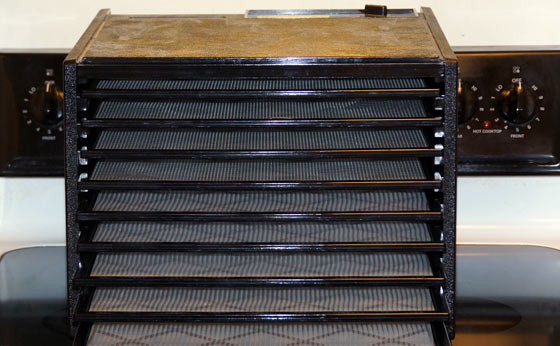Jerky Dehydrator Temp That’s Safe, And What I Use

Dried dehydrated meat (jerky) has traditionally been made by drying meat at low temperatures for a long period of time. So what’s the jerky dehydrator temp to use? Traditionally, this ranged from 140°F – 170°F. But let me continue…
The processing conditions can make it difficult to assure a safe end result.
Safe Factors include:
– Quality of meat
– Drying temperature
– The Dehydrator itself
– Method used
When using a home dehydrator or any method or means to make homemade jerky, it is important to reach a sufficient temperature in the jerky drying process to kill pathogens such as Salmonella and E. coli O157:H7.
Note: The following home dehydrator Will get hot enough (at least 145 – 155 degrees-F) for homemade beef jerky. Many are not able to do this. That’s one reason I bought this one:
Excalibur Food Dehydrator
(view on amzn)
Here are some safety tips how to jerk safe dehydrated meat in your home dehydrator:
Use Quality Lean Meat
Use only lean meat in excellent condition. For jerky prepared from ground meat, use meat that is at least 93% lean.
Trim The Fat And Slice Thin
Trim meat of excess fat and slice no thicker than one-quarter inch (1/4″).
Tip: Partially freeze meat to make it easier to slice. Slice the meat with the grain if you wish to prepare the chewy jerky preferred by many.
Setting The Jerky Dehydrator Temperature
If you’re not sure about your dehydrator, determine and verify the true actual operating temperature when it’s turned on, but while empty.
Here’s how to do it:
Do not necessarily rely on the dehydrator’s temperature control setting until verified with an accurate thermometer.
Use a low profile thermometer with the proper range such as this one to verify the temperature:
Taylor Precision Thermometer (1-Inch Dial)
(view on amzn)
FIRST VERIFY JERKY DEHYDRATOR TEMP
Determine your dehydrator’s drying temperature using a low profile (so it fits in the tray) dial‐stem thermometer as follows:
– For an oven or a horizontal air‐flow dehydrator, place the thermometer inside the unit and close the door.
– For a vertical air‐flow dehydrator, stack 2 to 3 trays on the base and place the thermometer between the top 2 trays such that the dial is sticking out between the shelves.
– Turn the dehydrator on to its maximum setting; ideally 155°F.
– Record the temperature once it has stabilized.
Note: Do not verify the temperature when the dehydrator has food in it! Evaporate cooling occurs as the product loses moisture and this will give you an inaccurate temperature reading.
To safely dry meat at home, your oven or dehydrator must be able to maintain a temperature of at least 145° to 165°F.
Tip: Use only dehydrators with temperature control. Do not use dehydrators with factory preset temperature that can’t be controlled. Research at the University of Wisconsin‐Madison (2008) has shown that dehydrators with factory‐set temperatures that can’t be adjusted do not reliably produce a safe product and are not recommended.
Safe Drying Methods and Dehydrator Temps
How Long To Dehydrate Jerky
In research performed at the University of Wisconsin‐Madison, at that time only a few dehydrators on the market would maintain the necessary temperature of 145° – 155°F. The Nesco Gardenmaster and the Excalibur.
Nesco FD-1040 Gardenmaster – MADE IN USA
(view on amzn)
Each of these units contain a large heating element, they have strong air flow, and adjustable temperature settings.
Drying meat at a temperature below 145°F will produce a product that looks done before it is heated enough to destroy pathogens, and before it has lost enough moisture to be shelf-stable.
While dehydrating meat for a sufficient length of time, or a jerky dehydrator temp of 145° – 155°F may produce safe results, as a safety precaution use one of the following methods to dehydrate your meat:
Method 1: Dehydrate, then Oven Heat
Dry for 6 hours (or more depending on desired dryness) and remove jerky from the dehydrator. For an added measure of safety, place dried strips on a baking sheet. Heat in a pre-heated 275°F oven for 10 minutes, which should bring the internal temperature of the meat strips to at least 160°F. Strips thicker than 1/4″ (when raw) may require longer to reach 160°F. Remove the oven-heated meat from the oven, cool to room temperature, and package.
Method 2: Pre-Heat, then Dehydrate
Steam or roast meat strips in marinade to an internal temperature of 160°F before drying; heat poultry to 165°F (internal temperature) before drying. This pre‐heating step assures that any bacteria present will be destroyed before drying and a lower dehydrator temperature (130° to 140°F) can be used. Since it can be impossible to accurately measure the internal temperature of a thin strip of meat, you can boil meat in marinade (or water) for 5 minutes before drying. After heating (or boiling), dehydrate meat for 4 to 6 hours. No post-dehydration oven-heating is necessary. Unfortunately, this USDA‐recommended method may produce a dried, crumbly product rather than chewy, flexible jerky.
Shelf Life Of Dried Dehydrated Meat Jerky
Dried jerky can be stored for 1 to 2 months at room temperature; in the freezer for 6 months or longer. Vacuum package jerky to extend the shelf life! I store my dehydrated strips in glass ‘canning’ jars and use our FoodSaver vacuum sealer and jar lid seal attachment.
FoodSaver Vacuum Sealing System
(view on amzn)
This is THE most popular dehydrator cookbook:
The Ultimate Dehydrator Cookbook
(view on amzn)

[ Read: How To Dehydrate Chicken Strips ]
Note: As mentioned above, information source: University of Wisconsin‐Madison.
